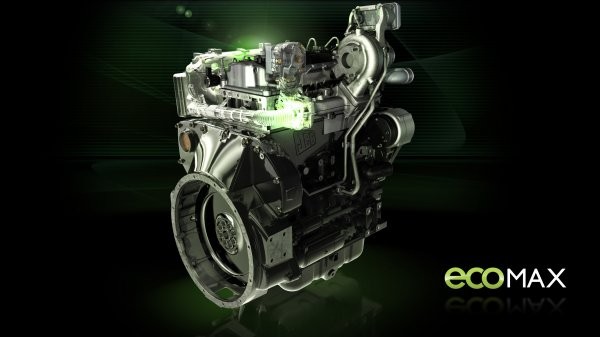JCB meets Tier 4 Interim Standard without need for any aftertreatment

JCB is the only leading equipment and engine manufacturer in the world to have met the Tier 4 Interim emissions standards by having no after-treatment. It has been achieved through the use of innovative in-cylinder technologies alone, rather than resorting to external exhaust after treatment or a diesel particulate filter (DPF).
Having invested more than $125 million dollars, and in excess of 110,000 hours of testing in 70 different machines, the JCB Ecomax engine offers power and torque ratings specific to construction and agricultural machinery, with low emissions and reduced fuel consumption. In addition, this no- after treatment approach makes it possible for JCB dealers to recalibrate the Ecomax engine for used equipment that is sold into lesser regulated countries with higher sulphur content fuels.
JCB’s Ecomax engine will be fitted into machines spanning the 74 hp to174 hp range, including JCB backhoe loaders, Loadall telescopic handlers, wheeled loading shovels, the JS excavators, rough terrain forklifts, skid steer loaders and compact track loaders.
Key features of the engine include:
. No requirement for DPF or additives
. Recalibration to run on poorer quality fuels, enhancing used machinery residual values
. 29,000 PSI high pressure common rail fuel injection
. Variable geometry turbocharger
. Cooled exhaust gas recirculation (EGR)
. LiveLink connectivity for engine ECU data analysis
. Ability to run on standard engine oils – reducing cost of ownership.
“We at JCB are proud that through engineering excellence and innovation, we have been able to achieve the power and torque that our customers require to get the job done, while lowering fuel consumption and meeting stringent emissions criteria from around the world,” said Alan Tolley, JCB’s Director of Engine Programs.
“We’ve invested heavily in the JCB Ecomax engine because we believe that our customers shouldn’t have to pay additional service and maintenance costs to meet emissions standards, when those standards can be achieved through the use of in-cylinder clean burning combustion technology.
“What’s more, by recalibrating the Ecomax engine, turning off the exhaust gas recirculation and reducing fuel injection pressures, it is possible for the engine to be run on higher sulphur content fuels. This process can be carried out by any of our 2,000 JCB dealers around the world using standard JCB service tools, offering a flexible, straightforward solution for our customers on the used equipment market.”
Holistic Approach To Environmental Responsibility
While all manufacturers have had to comply with emissions legislation, JCB, as a vertically integrated machinery producer, has concentrated on every aspect of machine design to reduce fuel use and cost for customers. Central to this approach has been the design and development of JCB’s own diesel engines, initially the Dieselmax and now the Tier 4 Interim complaint Ecomax range.
Using an innovative combustion process design (patent pending), JCB has brought together ultrahigh injection pressures of 29,000 PSI in the common rail system, with variable geometry turbocharger for rapid response at low rpm, to create a cleaner more efficient burn. Cooled exhaust gas recirculation is used to further reduce emissions, passing a small amount of the exhaust gas back through the engine to cool the combustion process and reduce Nitrogen Oxides (NOx) within the cylinder.
However it will be possible for JCB dealers to recalibrate the Ecomax engine for use in less sensitive emissions territories when sold on the used equipment market. This whole life approach to the engine ensures that JCB equipment will retain its maximum residual value, wherever its second use may be and whatever the requirements of the markets in which it may be put to work.
Great service advantages
All Tier 4 Interim engines must run on ultra-low sulfur fuels, and care of those fuels, to ensure perfect cleanliness, will be essential to the smooth running of Tier 4 Interim machinery. There will be upgraded fuel and air filters for Ecomax engines, plus the Tier 4 Interim engines will require a 5 micron water separator and fuel filter for the fuel supply line to supplement the 2 micron engine filter. In addition, a crankcase ventilation filter must be used, which will require replacement at 1,500 hour intervals. JCB Ecomax engines will however be able to run on standard engine oils, unlike engines with after treatment, which require a more expensive oil to function correctly.
Service costs will not rise substantially in part, due to the Tier 4 Interim engines having the same 500 hour service intervals as the previous models. It is estimated that there will be a nominal increase of 5 cents per hour over a typical 6,000 hour ownership period for a backhoe loader, an amount that will be easily offset by the fuel economy and productivity benefits of the Tier 4 Interim engine.
Electronic Control Benefits
As the Ecomax engines feature electronic control, JCB has been able to fully integrate engine diagnostics and analysis into its LiveLink telematic system on certain models. Customers will be able to access location information, service alerts, engine health alerts and other critical data.
With the Tier 4 Interim engine LiveLink will provide improved diagnostics, fuel economy and work related data, such as fuel economy in different working modes. This will allow customers to more closely manage the use of equipment, ensuring that maximum economy is achieved on site.
“JCB’s investment in engine technology has resulted in a market-leading range of engines that provide increased power and torque, lower down the rpm range, yet use less fuel and create fewer emissions,” said Mr. Tolley.
“We have been able to provide our customers with a solution to comply with European and American emissions legislation, without expensive after treatment or additives, through the use of innovative engineering. Of course there will be an additional cost for Tier 4 Interim engines, as they use sophisticated components and technologies. However we feel that the fuel savings and productivity benefits of the latest JCB machines will more than outweigh that initial premium.”


